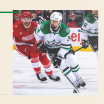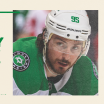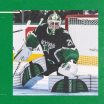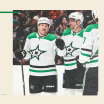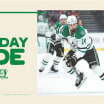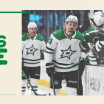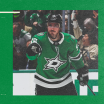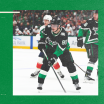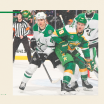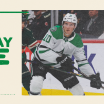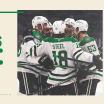It was early in Stars training camp, and Rick Bowness wasn't happy.
The veteran coach was barking out commands and demanding more from his team, laying down the law and pushing for better attention to detail. It wasn't unusual for Bowness, as he does pick his spots to be vocal in practice.
But then 30 minutes later when the Zamboni was ready to come out and resurface the ice before the second practice session, Bowness was seen picking up pucks and tossing them in a bucket -- a task typically reserved for rookies.
"That's Rick right there," said Stars general manager Jim Nill. "He going to hold his team accountable, but he's right in the fight with them."
'That's Rick right there': Bowness' bond, respect with Stars runs deep
Whether preaching details or picking up practice pucks, the 66-year-old's family coaching style has earned strong admiration
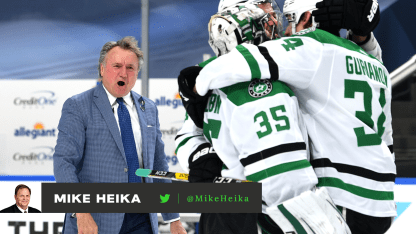
By
Mike Heika
Senior Staff Writer
The journey of Bowness, who recently celebrated his 66th birthday, is intriguing. He ended his playing career in 1984 and quickly stepped into the NHL coaching ranks. He worked his way up from assistant to head coach, and had stints with the Jets, the Bruins, the Senators, the Islanders and the Coyotes. He then settled into a role as assistant coach for almost two decades before he was promoted to head coach of the Stars in 2019.
RELATED: [Rick Bowness sits down with Mike Heika to discuss scoring, goalies and the Stars' season ahead]
Bowness helped lead Dallas to the Stanley Cup Final last season and has the Stars off to a 5-2-1 start this year, and a great deal of that is because of his experience and his personality.
"He's got good values, and he lives by them," Nill said. "He wants you to play by his structure, but he's very open to discuss it with the players. When he needs to lay the law down, he can. But the key to laying the law down is do people respect you? They do with him, because he earns that respect."
Stars captain Jamie Benn said it pretty clearly: "He's probably the best coach that I've played for. I've played for a lot of great coaches, but he's got to be right up there. Our relationship has definitely gotten stronger, closer. There's obviously a lot of communication between a head coach and a captain. The door is always open to his office and I can always go in there, as well as the rest of our team. A great person, a great coach."
Bowness said he developed his style when he was playing. A tough winger who bounced between the minors and the NHL, Bowness played 173 NHL games over nine seasons with the Flames, Red Wings, Blues and Jets. When he was ready to start coaching at age 29, he said he already had a plan.
"When I retired as a player, I said I'm going to coach the way that I would want to be coached, and that's pretty much what I have done" Bowness said.
Rick Bowness: A hockey journey like no other
So what is that way?
"My first coach in minor hockey, he just let us play and have fun, and that stuck with me," Bowness said. "I never liked playing for coaches that overcoached and dissected every little thing. It's an imperfect game, it will always be an imperfect game, so you've got to let players play to their strengths. Work with them to correct some weaknesses, work with them to play into a team system, but a player has to go onto the ice feeling comfortable and trusting his own instincts. You can never take that away from them."
That philosophy has helped the Stars embrace their offensive side, and Dallas has gone from 26th in goals per game at 2.58 last season to second at 4.00 this year. Now, that's just eight games into the campaign, and the power play is sizzling, but there is a definite feel among Stars players that they are a different team.
John Klingberg has seen his stats go through the roof and said he enjoys the decision of the coaching staff to activate the defensemen and play a more aggressive brand of hockey. But he said that requires honest conversations when players make mistakes.
He said that's a strong suit for Bowness.
RELATED: [Why the Stars' run to the Stanley Cup Final in 2020 started with Rick Bowness]
"He's a huge part of this team. The players love him," Klingberg said. "He's very emotional, and he's honest. When you play a little bad for a moment or if you play really good, he will let you know. The feedback can be positive or it can be negative, but that's what you want from your coach, you want him to be honest."
That honesty has created a bond with the team, something that probably helped a great deal when they were stuck in the playoff bubble in Edmonton. By facing issues every day, the team actually grew to be a family that thrived in captivity. It was a dynamic that certainly is helping this season.
"With Bones, it's just great communications," said Blake Comeau, one of the team's alternate captains. "He's got an open door, he's very interactive with the players. It doesn't matter if you're an older guy or a younger guy. You see him chatting with the players, he's always in a good mood. He's the type of personality that you want to play hard for, you want to compete hard for."
Bowness is often seen conversing with players on the practice ice, and players say he takes that even further off the ice.
"He wants to know how you feel," said center Radek Faksa. "He's talking to everyone and I think it's important to have 1-on-1 talks for a coach to know what a player needs. He's great for us."
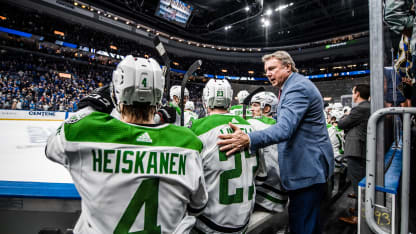
Nill said Bowness was able to create that style when he was an assistant coach, and he's impressed that he's been able to keep it as a head coach.
"I definitely think he's more comfortable now," Nill said of Bowness adapting after the change to head coach. "When you're the assistant coach, you're like the mum and everyone wants to run to you and get a hug. When you're the head coach, you're the 'dad' and you have to be the authority in the house. Dad is the guy who has be the bad guy. That's the difference in the roles. When you're head coach, you have to make the decisions, and sometimes people don't like those decisions, but he has done a great job of walking that line."
Bowness credits assistants John Stevens, Todd Nelson, Derek Laxdal and Jeff Reese for the strong communication. He said the chemistry within the coaching staff is as important as the chemistry within the team.
"This is a different job and you do need to learn to delegate and look at the big picture," he said. "It's an adjustment, but I have a great staff and they really do help me a lot. If you have to delegate, you have to have trust they will get the job done, and I do. I've been in their role before where I had to do that, and I know what they're going through.
"I wanted to have input, I wanted to have my opinion valued when I was in that role, and I make sure these guys know that their opinion is definitely valued."
RELATED: [Five things you should know about Stars coach Rick Bowness]
That's just one more way he finds to keep everyone happy.
When Bowness took over for Jim Montgomery in the middle of last season, he agreed to be head coach until the end of the season and then reassess his position. After losing in Game 6 of the Stanley Cup Final, he said he knew he wanted the responsibility and the opportunity that comes with being the head coach of the Dallas Stars.
"There comes a time when you put your time in with your team and you don't want to give it to anyone else," he said.
And they don't want anyone else to take over, either.
"He's got a good hockey mind, he's a smart coach and he treats everybody fairly," Comeau said. "I think that's all you can ask for."
This story was not subject to the approval of the National Hockey League or Dallas Stars Hockey Club.
Mike Heikais a Senior Staff Writer for DallasStars.com and has covered the Stars since 1994. Follow him on Twitter @MikeHeika, and listen to his podcast.

